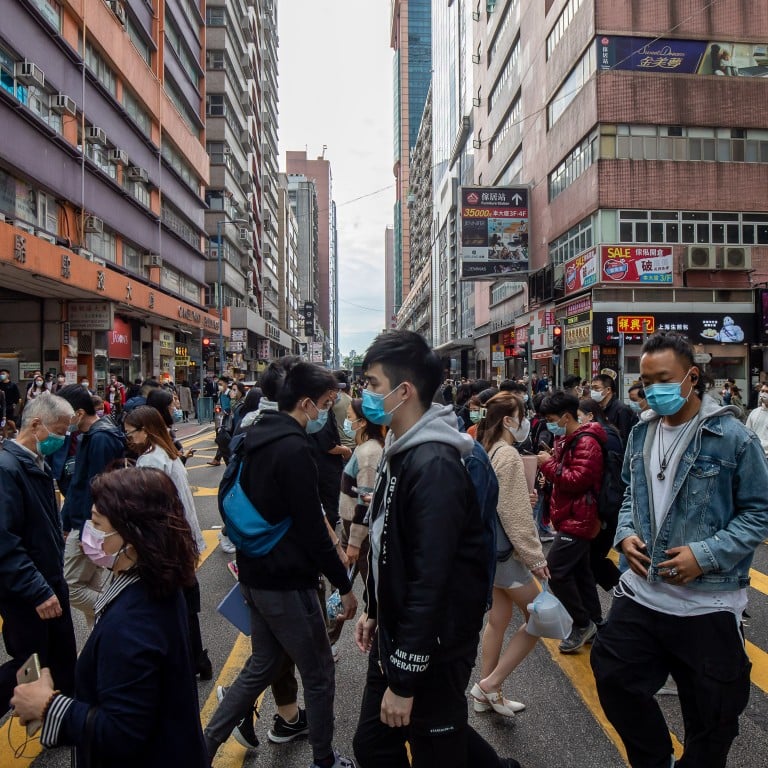
113,200 residents leave Hong Kong in 12 months, contributing to 1.6 per cent drop in population, census figures show
- Figures released by Census and Statistics Department show city’s population slid to 7,291,600 from 7,413,100 the year before
- Number of departures was nearly 1.3 times higher than amount recorded between mid-2020 and mid-2021, when 89,200 residents left
More than 113,000 residents have left Hong Kong amid an emigration wave over the past 12 months, contributing to a record 1.6 per cent drop in the population and marking the second straight annual decline in numbers.
Figures released by the Census and Statistics Department on Thursday showed the population slid to 7,291,600 from 7,413,100 recorded in the middle of 2021. The city recorded 61,600 deaths and 35,100 births between mid-2021 and mid-2022, leading to a decrease of 26,500 people.
The decline to 7.29 million people was sharper than last year’s 1.2 per cent decrease.
‘Alarming’ population drop as nearly 90,000 leave Hong Kong in 12 months
The data showed 113,200 residents left between mid-2021 and mid-2022, continuing a trend of Hongkongers packing their bags for other shores in recent years.
The number of departures was nearly 1.3 times higher than the amount recorded the year before, when 89,200 residents left. In the 12-month span before that, covering widespread social unrest and the enactment of the national security law, about 20,900 people left.
Aside from newborns, the city’s population was supplemented by the addition of 18,300 one-way permit holders from mid-2021 to mid-2022. The immigration scheme allows 150 mainland Chinese to settle in Hong Kong each day.
A government spokesman said stringent border control rules and quarantine measures adopted to control Covid-19 infections risks were partly responsible for the limited inflow of people, noting the number of one-way permit holders and foreign domestic helpers remained low.
“Hong Kong residents who had left Hong Kong before the pandemic may have chosen to reside in other places temporarily or were unable to return to Hong Kong,” he said of the outflow.
But the government said it did not have statistics solely on emigration of Hong Kong residents.
“Net movement includes the movement of Hong Kong residents into and out of Hong Kong for various purposes such as work, study and migration, but the breakdown of figures is not available,” the spokesman said. “Hong Kong residents travelling abroad are not required to declare to the government their purpose of travel.”
He also noted the city’s fertility rate was persistently among the lowest in Asian economies.
“The plunge in births in the recent two years might also be attributable to the outbreak of Covid-19 since early 2020,” he said, adding that the gradual increase in the number of deaths over the past five years was in tandem with the ageing population.
The 35,100 births recorded over the past year was a 29 per cent drop from the 49,500 that occurred in the 12 months from mid-2019.
6 months on, how are Hong Kong’s BN(O) families doing and where are they now?
Several Western countries, including Britain, Canada and Australia, have offered “lifeboat” settlement schemes to Hongkongers in response to Beijing imposing a national security law on the city in 2020.
Between January 2021 and March this year, about 123,400 Hongkongers applied for British National (Overseas) visas to settle in the United Kingdom, with 113,742 gaining approval. The figure for the second quarter is expected to be announced at the end of this month.
Professor Paul Yip Siu-fai, a population health expert at the University of Hong Kong, predicted the emigration wave would persist for at least another two to three more years as residents, particularly the young and professionals, took advantage of the relaxed immigration pathways for Hongkongers.
“The pull and push factors are in one direction, which go against Hong Kong,” he said.
Yip called on the government to address the housing shortage and concerns about the city’s overall development.
“Some people do not understand the national security law, they are really worried. So the government should explain the law clearly to allay their concerns. This is very important,” he said.
The upward trend in the number of deaths in the coming years was expected in an ageing society, he noted, adding he could not foresee any improvement in the birth rate, which had sunk to a “historically low” level.
Yip said he expected the population to continue to shrink and put further pressure on the survival of kindergartens and primary schools due to insufficient pupils.


